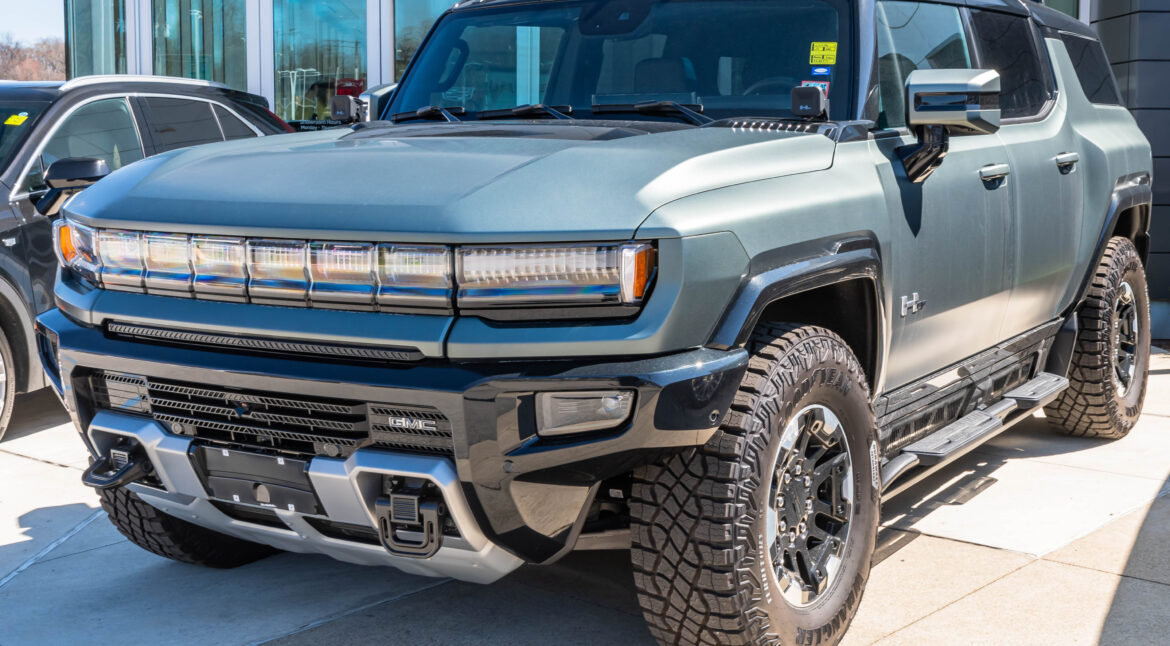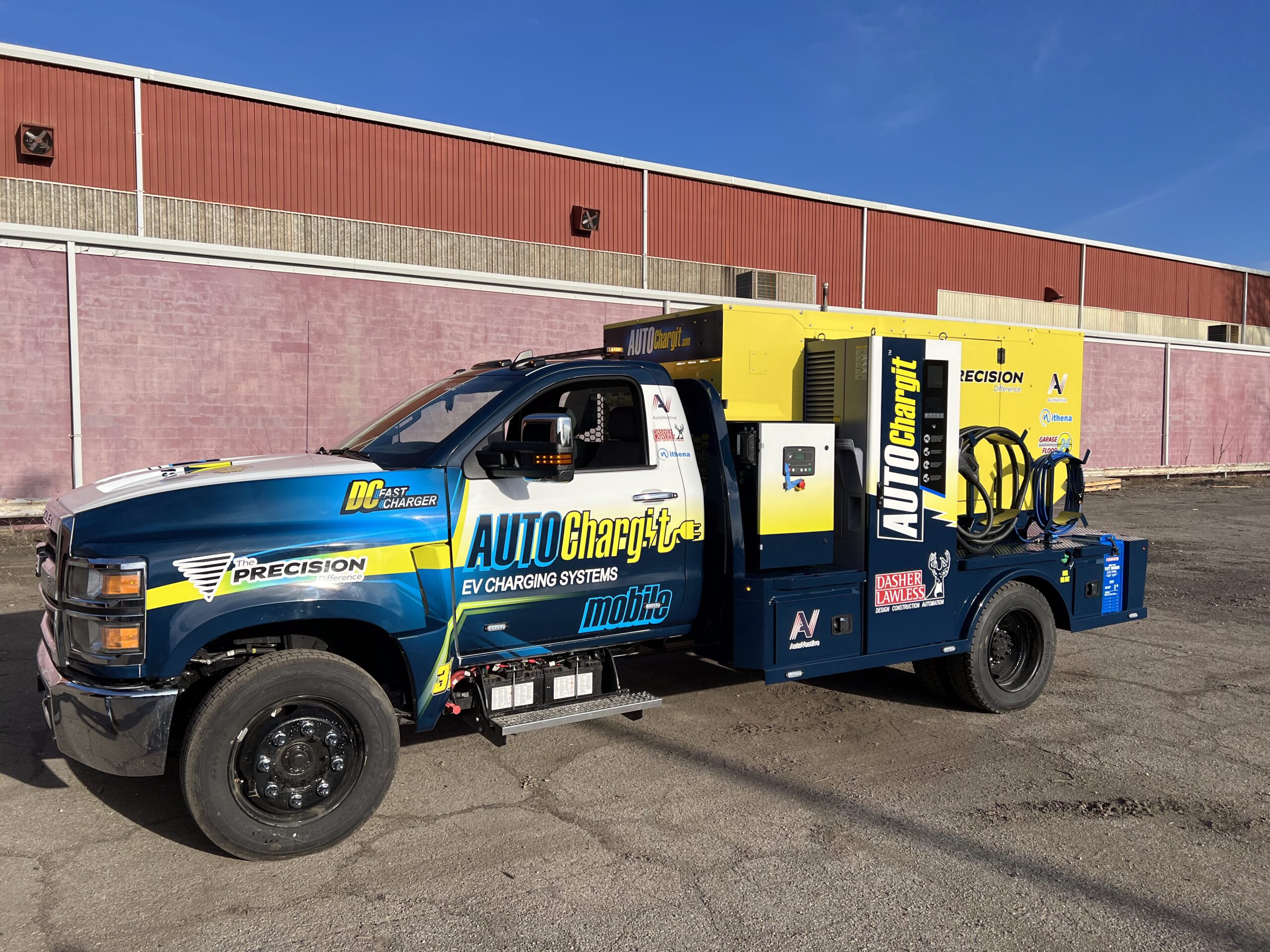Electric car manufacturing is rapidly transforming, driven by increasing EV sales and innovations in the production process. GM’s Factory Zero, located in Detroit-Hamtramck, is at the forefront of this transformation. This facility leads GM electric vehicle production by producing advanced models such as the GMC Hummer EV and Sierra EV models, Chevrolet Silverado EV and Cruise Origin.
Precision Vehicle Logistics (PVL), AutoVentive‘s sister company, is a critical factor in this success, which plays a decisive role in streamlining the car manufacturing supply chain to support GM’s ambitious EV goals. From site preparation to logistics and distribution, PVL ensures that every component of the electric vehicle manufacturing process runs smoothly.
The Shift Toward Electric Vehicles and Supply Chain Optimization
The shift toward electric mobility has fundamentally transformed the automotive industry. With the rise of new electric car registrations and global sales of electric cars in recent years, the pressure on automakers to keep pace with EV adoption is higher than ever. Last year, GM recognized the need for a flexible and robust supply chain to address the unique challenges of electric vehicle production.
At Factory Zero, GM’s first fully dedicated electric vehicle assembly plant, the transition to full-scale EV production is guided by the company’s vision of a future with net zero emissions, zero congestion and zero crashes. Precision Vehicle Logistics was critical in optimizing the EV supply chains at Factory Zero, ensuring the smooth movement and storage of electric vehicle batteries, battery packs and other vital components.
This collaboration sets a new standard for sustainable automotive manufacturing, balancing speed, efficiency and environmental responsibility.
Factory Zero exemplifies how the automotive industry can meet the increasing demand for more electric vehicles while striving toward a future with emissions reduction in the coming years.
What are the challenges faced in scaling up electric vehicle production?
Scaling up electric vehicle production faces several challenges, including securing a stable EV supply chain, managing battery costs and sourcing materials, upgrading manufacturing facilities to handle higher volumes and integrating reliable EV charging infrastructure while meeting increasing electricity demand and emission standards of the EV market.
 EV Charging and Supply Chain Efficiency
EV Charging and Supply Chain Efficiency
A key component of GM’s electric vehicle production strategy is the deployment of EV charging infrastructure, particularly the GM 5500 120 KW DC Fast Charger. Managed by PVL, this system ensures that larger batteries for vehicles like the Hummer EV and Silverado EV remain fully charged and ready for distribution.
By integrating this technology into the broader car manufacturing supply chain, GM can maintain production quality and ensure that vehicles are always ready for shipment. This also helps to reduce potential delays, allowing GM to meet increasing demand for electric car models in major markets like the United States.
Phase 1: Site Preparation as the Backbone of Electric Vehicle Production
The foundation of successful electric vehicle production lies in thorough and precise site preparation. PVL was critical in preparing Factory Zero for large-scale EV manufacturing and EV sales growth, ensuring that every infrastructure and logistical component was properly addressed before production began. Without this groundwork, the complex processes involved in electric vehicle manufacturing would face bottlenecks and inefficiencies.
PVL executed a comprehensive plan to get the facility ready, focusing on several essential areas:
Manufacturing capacity and facilities setup
One priority was ensuring the manufacturing facilities were designed and equipped for high-volume production. This meant optimizing physical infrastructure to support the production of advanced EV models like the Hummer EV and Silverado EV.
Identifying potential infrastructure bottlenecks was crucial to ensuring these manufacturing facilities could meet the increasing demand for global electric car sales without disruption.
Security measures
Given the high value of the EV components being manufactured and stored, implementing robust security was another critical aspect. PVL ensured that physical access points were limited and controlled to safeguard the production process.
This included securing the site from outside access to prevent potential breaches and maintaining the integrity of EV batteries and battery packs on-site, which are vital for optimizing energy density.
 Safety and quality protocols
Safety and quality protocols
In a high-volume production environment, worker safety and product quality are paramount. PVL worked with GM to establish safety protocols that met industry standards, ensuring that all personnel were adequately equipped with personal protective equipment (PPE) and that work environments were free from hazards.
Safety measures were also implemented to protect product quality throughout the electric vehicle manufacturing, minimizing potential vehicle damage during assembly and storage.
Removal of organic hazards and site clearing
Like many EV manufacturers, Factory Zero faced the challenge of organic obstructions such as overgrown greenery and natural debris.
Precision Vehicle Logistics prioritized clearing these hazards to ensure smooth operations and maintain an unobstructed and safe working environment. This process was vital to creating a site ready for large-scale production and shipping.
Infrastructure updates
Coordination with third parties and infrastructure updates, including the electricity grid, were also required to ensure the facility was fully operational. This included upgrading the site with essential public charging points for vehicle testing and battery maintenance.
These EV charging stations played a key role in maintaining electric car batteries at optimal levels, ensuring that vehicles were fully prepared for distribution as part of the broader car manufacturing supply chain.
Electronic Data Interchange (EDI) systems setup and coordination
PVL also ensured that all electronic data interchange (EDI) and communication systems were correctly set up, enabling seamless communication between GM, suppliers and third parties. This business model was essential for tracking production data, managing logistics and ensuring that every stage of the supply chain operated smoothly.
PVL ensured that Factory Zero was fully operational and ready for production by meticulously preparing the site and addressing potential obstacles early.
Their efforts helped streamline the entire electric vehicle manufacturing process, from new registrations of the electric cars to final shipping, creating a smooth and efficient pipeline from start to finish.
Phase 2: Start of Shipping and Supply Chain Management
As GM electric vehicle production ramps up, the next phase in the supply chain focuses on shipping and distribution. PVL ensures that all systems are optimized to handle the growing demand, ensuring that the share of electric car sales remains consistent with GM’s production capacity.
By maintaining strong communication with management and staff, PVL identifies any gaps in the supply chain and addresses them swiftly to avoid delays. This efficiency is key to meeting customer demand as GM scales up production to expand total car sales in North America and globally.
Phase 3: Growth and Opportunities in Electric Vehicle Production
The rise in electric car registrations has opened new growth opportunities for GM and Precision Vehicle Logistics. GM and its partners are exploring ways to scale production at lower incremental costs as the total sales for electric SUVs and electric models continue to expand.
This includes refining battery manufacturing processes to manage battery costs and ensuring that larger batteries with (gigawatt-hours) GWh of battery equivalent are available to meet demand.
By consistently evaluating the car manufacturing supply chain, GM and PVL are positioned to capitalize on growth in EV sales share in the coming years, further solidifying GM’s leadership in sustainable automotive manufacturing.
 Advantages of Using Precision Vehicle Logistics‘ Charging Unit
Advantages of Using Precision Vehicle Logistics‘ Charging Unit
One key component in GM’s electric vehicle production strategy is using PVL’s diesel-powered charging units. These units offer several distinct advantages over other systems, playing a crucial role in supporting Factory Zero’s operations and ensuring the smooth flow of the car manufacturing supply chain.
1. Greater Control Over Refueling
PVL’s charging units operate on diesel, giving GM complete control over refueling. Unlike propane-based units, which require third-party services for refueling, the diesel-powered system allows GM to manage the process internally.
This autonomy reduces dependency on external suppliers and helps eliminate production delays caused by unexpected fuel shortages.
2. Minimized Downtime
In electric vehicle manufacturing, minimizing downtime is critical to maintaining production schedules. PVL’s charging units ensure a more reliable workflow by reducing the risk of outages.
In contrast, propane-powered units have been known to run out of fuel unexpectedly, causing significant downtime while waiting for third-party services to arrive.
GM has maintained consistent charging capacity by switching to diesel-powered units, supporting the uninterrupted flow of electric vehicle production.
3. Immediate Response to Issues
Another major advantage of PVL’s charging units is their rapid response time in the event of any malfunctions. When an issue arises, the PVL team resolves it by the next business day, ensuring that the units are back online with minimal disruption to the electric vehicle manufacturing process.
This swift problem-solving capability allows GM to avoid costly delays and keep projects on track, a key component of optimizing electric vehicle production.
4. User-Friendly Design
PVL’s charging units feature a user-friendly design that simplifies operation and troubleshooting. This design reduces the need for extensive training, allowing operators to quickly get the system running without needing specialized skills.
By stripping away unnecessary complexities,PVL’s units empower operators to focus on their tasks efficiently, increasing overall productivity and reducing potential frustration during operations.
5. Extended Battery Life
A standout feature of PVL’s units is their built-in 12V battery chargers. These chargers can revive completely drained units, restoring them to full operational capacity without additional equipment or external assistance.
This capability is precious in ensuring electric vehicle batteries remain charged and ready for shipment, contributing to smoother logistics and avoiding disruptions in the car manufacturing supply chain. It also extends the units’ life, reducing maintenance costs and keeping production timelines intact.
6. Uninterrupted Performance
The charging units help ensure that Factory Zero’s operations remain on schedule by prioritizing ease of use and reliability. The combination of diesel power, user-friendly design and extended battery life minimizes interruptions, allowing GM to meet the increasing demand for electric car sales in major markets like the United States and globally.
This efficiency is essential in an industry where even small delays can ripple through the entire EV supply chain, impacting vehicle readiness and shipping timelines.
By leveraging these key advantages, the diesel-powered charging units are critical in supporting Factory Zero’s overall electric vehicle production.
Their reliability, flexibility and user-friendly features ensure that GM can continue producing and shipping EVs efficiently, meeting the rising demand for electric cars in the coming years while maintaining quality and operational integrity.
Leading the Future of Electric Vehicle Production
General Motors and Precision Vehicle Logistics are leading the way in electric vehicle production as the world moves toward an electric future.
By optimizing the car manufacturing supply chain and integrating advanced technologies like EV charging, PVL ensures that GM can meet the growing demand for more electric vehicles while continuing to innovate.
Together, GM and PVL are setting new standards for sustainable automotive manufacturing, positioning themselves as leaders in the rapidly evolving electric mobility landscape and global EV outlook.
Ready to Accelerate Your Electric Future?
Discover how Precision Vehicle Logistics and AutoVentive can help streamline your electric vehicle production and supply chain operations. Request a demo today to learn more about our innovative solutions designed to meet the demands of a zero-emission, zero-congestion and zero-crash future.


 EV Charging and Supply Chain Efficiency
EV Charging and Supply Chain Efficiency Safety and quality protocols
Safety and quality protocols Advantages of Using
Advantages of Using 